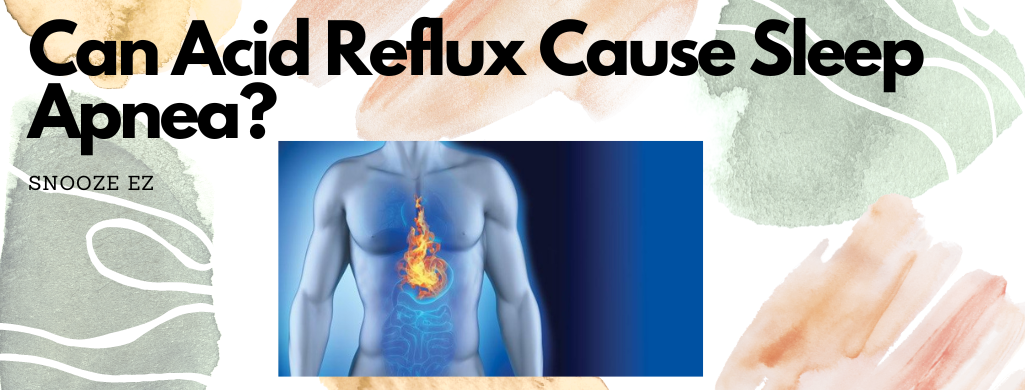There is no real evidence that acid reflux causes sleep apnea.
Do you suffer from acid reflux and sleep apnea? You may be wondering if there’s a connection between the two.
Sleep apnea is a dangerous condition that affects millions of people each year. The most common type of sleep apnea, obstructive sleep apnea (OSA), is caused by temporary blockages in the airway. It can lead to interrupted breathing and other health issues, such as heart disease and stroke.
Acid reflux, also known as GERD (Gastroesophageal Reflux Disease), is an uncomfortable GI disorder in which the stomach acid backs up into the throat or esophagus. Acid reflux may present itself with burning sensation in your chest or throat accompanied by coughing, hoarseness, bloating and difficulty swallowing.
What many don’t realize is that acid reflux could possibly be causing an even more serious problem – sleep apnea. In this article, we will look at how these two conditions are related and discuss ways to address both disorders.
Does acid reflux cause sleep apnea?
The answer to the question is not a straightforward one.
The relationship between acid reflux and sleep apnea is complicated. While it is not proven that acid reflux causes sleep apnea, there is evidence of a link between them. Studies have found that people with GERD often experience more severe symptoms of sleep apnea than those without the disorder. This suggests that acid reflux can worsen existing sleep apnea or maybe even trigger new cases in some people.
It is possible that acid reflux itself may be causing sleep apnea, or it may be due to an underlying condition such as obesity or a deviated septum. It is also possible that the two conditions are not related at all and simply exist in parallel. Some researchers do believe that acid reflux over time can cause sleep apnea by causing blockages due to muscle spasms and/or inflammation in the throat.
In any case, it is proven that more people do suffer from acid reflux who have been diagnosed with sleep apnea. A study in 2010 found that out of all the participants who suffered from OSA, 60% of them also had acid reflux.
Why is acid reflux bad at night?
Acid reflux can be very difficult to manage and is often worse at night when we are lying down. This is because of a natural phenomenon called gravity. When you’re standing or sitting there’s less chance for the acid in your stomach to make its way up into your esophagus. As we are awake during day time we are normally upright so in this position gravity helps us to keep our food down instead of it coming back up again.
But in the evening, as the day winds down, many of us tend to relax and as soon as we start doing that acid reflux can kick in more severely. In particular when we lay ourselves into bed it is easy for the stomach acid make its way up again due to gravity not working as usual which ultimately leads to much more discomfort and pain than normal levels throughout daily life.
Swallowing frequently may help quell some of this additional movement, but there isn’t a guarantee whenever you lie down that everything will remain where it should be. Also, the lack of swallowing while we are asleep means that the acid has a much easier time making its way back up.
How sleep apnea causes acid reflux?
A particularly concerning link between acid reflux and obstructive sleep apnea is the increase in gastric pressure which happens when an episode of OSA occurs. During sleep apnea, air becomes blocked and breathing ceases. When this happens there is an increase in air pressure in the lungs requiring more effort to resume breathing normally again, thus causing acid to be forced back up into the esophagus resulting in acid reflux.
In addition, once normal breathing patterns are regained there will be an influx of air sudden enough to push stomach contents back up. These breathing factors contribute to a higher general probability of suffering from acid reflux as a result of having sleep apnea.
Treatments for sleep apnea and acid reflux
- Continuous Positive Airway Pressure (CPAP): CPAP is a common treatment for sleep apnea and helps keep the airways open by providing a steady stream of air through a mask that is worn while sleeping. This has also been proven to help symptoms of GERD.
- Weight Loss: One of the leading causes of sleep apnea and acid reflux is being overweight or obese, so losing weight will definitely help reduce symptoms of both.
- Medication: Several medications can be used to help treat acid reflux including proton pump inhibitors, histamine H2 receptor antagonists, and foam barrier agents.
- Lifestyle Changes: Eating smaller meals throughout the day and avoiding foods like chocolate, spicy food, caffeine and alcohol may help reduce symptoms of acid reflux. Quitting smoking may also help with acid reflux as nicotine can weaken your lower esophageal sphincter (LES), which increases your risk for reflux symptoms.
- Elevating Your Head While Sleeping: Keeping your head elevated with an extra pillow or adjustable bed may also help alleviate some of your symptoms. It helps prevent stomach acids from entering your esophagus while also helping reduce chances of your airway collapsing compared to lying down flat on your back in bed.
Conclusion
In conclusion, it is still unclear if acid reflux can cause sleep apnea or not. However, studies have shown that there is a link between the two conditions and that people with acid reflux may be more prone to developing sleep apnea. If you suffer from both GERD and sleep apnea, it is important to speak to your doctor to rule out any underlying issues and to determine the best course of action.


